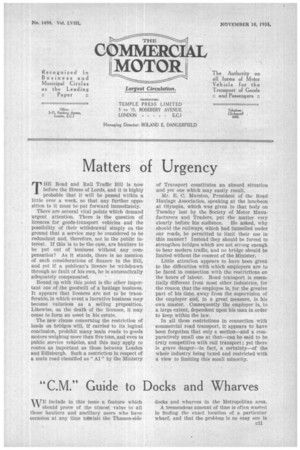Matters of Urgency
Page 41

If you've noticed an error in this article please click here to report it so we can fix it.
THE Road and Rail Traffic Bill is now before the House of Lords, and it is highly probable that it will be passed within a little over a week, so that any further opposition to it must be put forward immediately.
There are several vital points which demand urgent attention. There is the question of licences for goods-transport vehicles and the possibility of their withdrawal simply on the ground that a service may be considered to be redundant and, therefore, not in the public interest. If this is to be the case, are hauliers to be put out of business without any compensation? As it stands, there is no mention of such considerations of finance in the Bill, and yet if a publican's licence be withdrawn through no fault of his own, he is automatically adequately compensated.
Bound up with this point is the other important one of the goodwill of a haulage business. It appears that licences are not to be transferable, in which event a lucrative business may become valueless as a selling proposition. . Likewise, on the death of the licensee, it may cease to form an asset in his estate.
The new clause concerning the restriction of loads on bridges will, if carried to its logical conclusion, prohibit many main roads to goods motors weighing more than five tons, and even to public service vehicles, and this may apply to routes as important as those between London and Edinburgh. Such a restriction in respect of a main road classified as " Al " by the Ministry of Transport constitutes an absurd situation and yet one which may easily result.
Mr. E. C. Marston, President of the Road Haulage Association, speaking at the luncheon at Olympia, which was given to that body on Tuesday last by the Society of Motor Manufacturers and Traders, put the matter very clearly before his audience. He asked, why should the railways, which had tunnelled under our roads, be permitted to limit their use in this manner? Instead they should be forced to strengthen bridges which are not strong enough to bear modern traffic, and no bridge should be limited without the consent of the Minister.
Little attention appears to have been given to the difficulties with which employers are to be faced in connection with the restrictions on the hours of labour. Road transport is essentially different from most other industries, for the reason that the employee is, for the greater part of his time, away from the supervision of the employer and, in a great measure, is his own master. Consequently the employer is, to a large extent, dependent upon his man in order to keep within the law.
In all these restrictions in connection with commercial road transport, it appears to have been forgotten that only a section—and a comparatively small one at that—can be said to be truly competitive with rail transport ; yet there is grave danger—in fact, a certainty—of the whole industry being taxed and restricted with a view to limiting this small minority.




























































































































